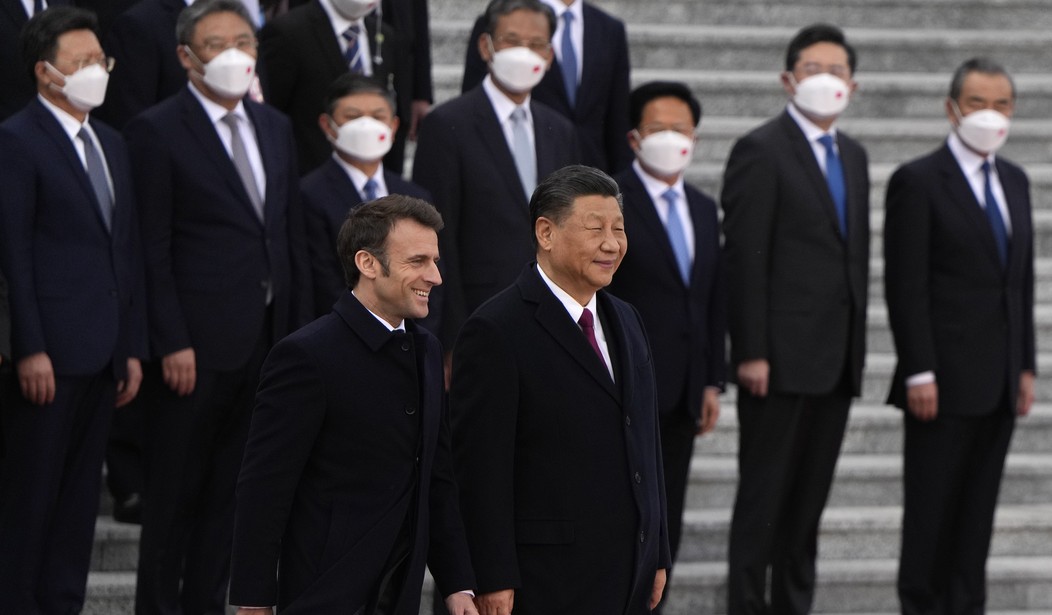“You don’t speak for Europe.”
That appears to be the message that most of Europe is sending to French President Emmanuel Macron. The response to his newly launched love affair with Xi Jinping has been surprisingly negative thus far. That’s at least somewhat encouraging in terms of maintaining some level of unity among the NATO allies. The latest to join the ranks is Germany. German Foreign Minister Annalena Baerbock is on her own two-day trip to Beijing, but China shouldn’t expect the same warm and fuzzy embrace that Macron offered. Before leaving, Baerbock stated explicitly that Germany believes all parties in the region, particularly China, need to “contribute to de-escalation” by refraining from “aggressive military maneuvers” in the Taiwan Strait. And she wasn’t the only one pushing back on Macron’s move to isolate Europe from the United States. (Politico)
As Baerbock embarked on her two-day visit Wednesday evening, officials in Berlin were eager to stress that Germany and the EU care about Taiwan and stability in the region, arguing it’s mainly China that must contribute to de-escalation by refraining from aggressive military maneuvers close to the island nation.
Baerbock’s trip comes amid international backlash against Macron’s comments in an interview with POLITICO, arguing Europe should avoid becoming America’s follower, including on the matter of Taiwan’s security. Although German government spokespeople refused to comment directly on the French president’s remarks, a spokesperson for the foreign ministry specifically called out Beijing when expressing “great concern” over the situation in the Taiwan Strait.
“We expect all parties in the region to contribute to peace. That applies equally to the People’s Republic of China.”
Baerbock’s spokesperson went on to say that China’s military exercises in and over the strait “increase the risk of unintended military clashes.”
That’s a very diplomatic way to put it, as you might expect. But everyone involved in this game knows that there’s nothing “unintentional” about what China is doing. At this point, they seem to be very interested in a military clash if the signs are in their favor. But most analysts who are weighing in on the question seem to believe that China is still testing the waters and waiting to see what the response from the rest of the world will be.
China has a lot to consider before committing to a military strike across the strait. Military analysts have been saying for some time now that if China truly wants to take the island, they probably can. But it would come at a brutal, bloody price and China would be significantly weakened militarily when it was over.
That’s not a universal belief, however. The Center for Strategic and International Studies has been running war games on this subject for several years. Their conclusion is that the invasion would eventually fail, but the cost to the United States and Japan would be even higher than the losses suffered by China.
A Chinese invasion of Taiwan would probably fail if the United States helped defend the island – but would come at a debilitating cost to the American military itself, according to a US think tank.
Military experts brought together by the Center for Strategic and International Studies to war game the conflict said every likely direct participant in a war – the United States, China, Taiwan and Japan – would experience “enormous” losses.
Chinese missiles would probably destroy US airbases in Japan and as far as Guam, and sink two US aircraft carriers and between 10 and 20 destroyers and cruisers as the invasion opened.
Of course, that analysis relies on one critical assumption. The United States would have to be committed to a full military response, knowing that few of our allies outside of Japan would wade into the fray with us. Would Joe Biden really order military arms and equipment right into the middle of that mess?
I don’t think we can take that as a given by any means. When China sent its spy balloon for a grand tour of North America, including loitering at times over our sensitive nuclear facilities, Biden did nothing until public pressure forced him to after the journey was complete. When Russia shot down one of our drones in international airspace over the Baltic Sea, Biden similarly did nothing but issue a few stern words. He hasn’t exactly established a reputation as a counterpuncher.
Also, suspicions remain that the Biden family may be compromised when it comes to China, largely due to the activities of one infamous crack addict and his pals. China is no doubt taking all of these factors into consideration. If you remove U.S. support from the equation, they could probably take Taiwan in a matter of weeks. And they certainly have the incentive to try, but only if the cost isn’t too great.








Join the conversation as a VIP Member